The Collector's Daughter Read online
Page 28
He watched her one afternoon, sitting in an armchair, gazing into space, and saw a blankness in her expression, a haziness. It wasn’t the expression of someone who was lost in thought. Her eyes were open but there was nothing behind them.
“What are you thinking about?” he asked, and she was startled. She frowned, trying to remember.
“Nothing much,” she said, and he suspected that was the truth. He turned his head so she couldn’t see the tears glinting behind his glasses.
Patricia stayed for the first week after Eve came out of hospital, making all their meals and helping her to wash and dress. “Keep her calm,” the doctor had said, and together they tried to work out a routine that would be easy for her.
She loved comedy programs on television, especially the ones with canned laughter. Brograve wasn’t sure she got the jokes but she chortled along quite happily. She didn’t like violence, flinching and trying to cover her face as if terrified, so they learned to avoid crime shows and war films. Once when Patricia raised her voice to an insurance salesman on the telephone, Eve became distressed and rushed out to the hall screaming, “No! Stop it! Stop!,” and only calmed down when she had hung up.
Emotions washed over her at random, without any obvious cause, but if she got sad, the national anthem always worked its magic, and she loved kisses and hugs.
Patricia tried to persuade him to hire a live-in caregiver. “How will you cope once I’ve gone home again, Dad? Won’t you get lonely when it’s just the two of you?”
He was surprised at the question. “Of course not! I’ve got Eve for company.”
“But it’s not her anymore, is it? Not really.”
“It is her!” He was adamant. She was still his Eve. Her personality was the same. She wanted everyone in the room to be happy just as she always had. He loved her more than ever now that she was newly helpless.
Once Patricia left, the two of them got into new routines together. Most of the morning was taken up with getting her dressed and eating breakfast, but they usually went out somewhere in the afternoon. On fine days he drove her to Kew Gardens or Hampton Court or stately homes with pretty gardens where they could walk and admire the trees and flowers. If it was raining they had afternoon tea in a smart hotel, or saw Patricia and their grandsons, or visited Maude and Cuthbert. In the evenings they had a picnic in front of the television, with cheese and crackers, biscuits and cakes, a sherry for her and a whisky for him. Who cared about eating a proper meal at their age, for goodness’ sake?
Brograve wasn’t unhappy. He found he could focus on the present most of the time. It did no good thinking back on what they had lost. He wasn’t going to start grieving for Eve when she was still there beside him, still his loving, sunny wife. But sometimes, as he lay in bed listening to her breathing, he couldn’t help comparing her mind now to the way it was before the last two strokes, just over a year earlier. They had been the cruelest.
In March 1972, she’d been invited to the opening of the Tutankhamun exhibition at the British Museum. The director walked her around the exhibits and she chatted knowledgeably about the iconic funeral mask made of sheet gold and the four anthropoid coffins that had been slotted inside the sarcophagus, about the shabti figures, the boat and the carriages, the guardian statues and the animal couches.
Some photographers persuaded her to pose for photographs next to the funeral mask. As she stood there, flashbulbs clicking, a journalist called out the standard question.
“You’re one of the only people who entered the tomb yet managed to avoid the curse. Why do you think that is?”
“Good genes,” Eve had replied, quick as a flash, making Brograve chuckle.
The Queen arrived and Eve chatted with her for a few moments—they knew each other because Porchy’s son trained her horses. Then she was interviewed by a journalist from The Times, and she was lucid and funny and articulate. Her memory had not let her down once. He’d been so proud of her that day.
She couldn’t have done that now. When the doctor came to see her at home, he asked her a series of simple questions.
“Where are we?” he asked.
“Framfield, of course,” she replied with certainty.
“What year is it?”
“Nineteen twenty-two. Maybe nineteen twenty-three.” She glanced at Brograve and he smiled and nodded.
“And who is the prime minister?”
She looked at Brograve again before answering, “Lloyd George?”
“Well done,” he said, nodding and writing something in his notes. “You’re doing just fine, Lady Beauchamp.”
Eve beamed, seeming pleased with herself, and Brograve smiled too, although there was an ache in his heart that never went away.
* * *
One morning, he pulled out the lavishly illustrated book that had been published to coincide with the British Museum exhibition, then sat beside Eve to show it to her. He didn’t mean to test her, just thought she might enjoy it. She touched some of the pictures with her finger, and watching closely, he convinced himself there was recognition in her eyes.
“Beautiful,” she said about an image of the gold and blue faience shrine.
There was a black-and-white photograph of her standing outside the tomb with Howard Carter and her father and she lingered over that for a long time. It was clearly ringing bells for her.
“That’s Pups,” Brograve said, pointing. “And Howard.”
“How is Howard?” she asked.
“He died a long time ago,” Brograve said, hoping it wouldn’t upset her. “You went to the funeral, with Porchy and your mother.”
“Yes, of course.” She nodded, calmly, and turned to the next page.
All morning she sat with that book, flicking the pages one way, then the other, and Brograve was sure she was remembering some of it. She seemed animated. He didn’t ask her any questions, though. That would have been cruel.
* * *
Maude often rang for a chat, and Brograve was glad of it because she was the one person he could tell the truth to: “Her memory’s shot to pieces, but sometimes there’s a flash of recognition. Like when you are tuning the channel on the television and it’s all fuzzy until suddenly a clear picture comes through. You twiddle the knob a little more to try and make it clearer and it vanishes again. But at least she’s happy.”
“I can tell she’s happy,” Maude replied. “You’re doing a wonderful job. I love seeing the two of you, although it sometimes makes me melancholy. If only she hadn’t had that car accident, she probably wouldn’t have had the strokes. . . .”
“You can’t think that way,” Brograve interrupted. “It does no one any good. We’re all at an age where bits of us are malfunctioning—although you seem to have gotten off lightly. You’re still as sharp and agile as ever.”
“Hardly!” she exclaimed. “Oh hang on, Cuthbert wants a word. He’s holding out his hand for the receiver, waving as if it’s something urgent. I’ll call again soon. Give Eve a kiss from me.”
Cuthbert’s voice came on the line. “Did you hear any more from that Egyptian woman, Ana Mansour?” he asked, without preamble.
“We haven’t heard since last May,” Brograve replied. “She took to her heels when she realized she wasn’t getting anywhere with us.”
“I have some news from a colleague in Cairo,” Cuthbert said. “It turns out the real reason she was sacked from the university was for being overzealous in tracking down and reclaiming Egyptian artifacts held in private collections overseas. She tried to blackmail a German millionaire and he called the police.”
Brograve wasn’t surprised. Deep down, he had always felt as if Ana didn’t fit the profile of an academic trying to make the history books accurate. “What did she do with the artifacts she reclaimed? Was she trying to sell them?”
“No, everything she found went to Egyptian museums. She had access to information about private collectors through her father’s old dealership, as well as through her own research. B
ut the university couldn’t be seen to condone her methods, and that’s why she was sacked.”
“My father’s gold clock has been missing since her visit,” Brograve said. “It did cross my mind to wonder if she might have taken it, but Eve talked me out of it.”
“I don’t have any evidence that she was a thief,” Cuthbert said. “My informant said she sees herself as a patriot doing the right thing for her country.”
Brograve remembered Eve’s disappointment that Porchy wouldn’t let her hand over the Tutankhamun items they found at Highclere. It had been obvious then that Eve had spoken to Ana since her last visit, and he wondered what had been agreed between them. Had Eve seen the woman again? Had she handed anything over? Was anything else missing from the apartment, besides his clock? It was hard to tell the way Eve moved things around. She was doing it more than ever now, like a nervous tic.
When he came off the phone he went into the sitting room and asked her: “Do you remember that Egyptian woman, Ana Mansour? The one who came here asking questions about the tomb.”
She nodded, but he wasn’t sure if he believed her. She often said whatever she thought he wanted to hear.
“Did you give her anything?” he persevered. “A present maybe?”
“No,” she said. “I think she was cross with me.”
Brograve replied, “I was cross with her. She lied to us. Did she ever come here when I wasn’t at home? Can you remember?”
Eve looked up at him, her eyes wide and childlike. “Did who come?”
“Ana Mansour.”
“Who’s that?”
He tried explaining, but her thoughts had wandered elsewhere, her fingers playing with the fringe of a blanket he’d draped over her knees.
“Do you believe in ghosts?” she asked.
“Not the kind that haunt you,” he said. “Not the scary kind you see in films. But I suppose we all carry the people we have loved in our memories. I still think of my brother, Edward, sometimes, and wonder what his life would have been like if he had lived.”
“Your brother died in the war,” she said. “You told me about it the night we met.”
Brograve shook his head, feeling choked at the window of lucidity. Such moments were rare now.
“I never met him, did I?” she said. “I wish I had. If he was anything like you, he must have been wonderful.”
“Why did you ask me about ghosts?” he asked.
She had a faint smile on her face. “Oh, just because . . .” she said.
Chapter Fifty-Six
London, August 25, 1976
Eve woke to the dawn chorus. It seemed as if it had never been so loud and urgent. She used to have a knack for identifying birdsong when they lived in the countryside, but you didn’t hear it so much in the city.
She listened hard, trying to separate the different calls: the tuneful melody of a blackbird, the chatter of jays, the cawing of a crow. “Get up, get up!” they were saying, but she and her husband had a routine. He always brought her breakfast in bed so she had to wait for him to get up first. This morning he was still sleeping soundly, so she decided to wait.
There was a heatwave that summer, and they slept with just a sheet on top and the windows flung wide to catch any breath of air. It hadn’t rained for months. There was a ban on watering gardens and Eve hoped her poor plants at the old house were not suffering too badly. She often thought about that garden, where she had spent so much time. The hollyhocks, the roses, the lupines . . . It had been so pretty, with the most delicious scents. They sometimes went to stately homes to look at the plants, but they hadn’t been since spring because of the heat. It could be dangerous for old people, according to the leaflet that came through the door.
She had discovered a gold clock hidden away in her bedside cabinet, buried among the unread books and tubes of hand cream. It seemed an odd place to keep it, she thought, but now it came in handy because she could simply open the door and check the time. Almost eight o’clock. He’d probably wake soon. He was lying on his back with his mouth slightly open, the way he did when he’d been snoring. It was lucky she slept soundly because he could snore like a bull.
A ladybug landed on the sheet and she recited the old rhyme in a whisper: “Ladybird, ladybird, fly away home. Your house is on fire and your children are gone.” She was pleased with herself for remembering this and turned to see if her husband had heard, but he was still sleeping.
Eve was starting to get hungry so she decided to waken him. She slid her head onto his shoulder and eased her body so she was pressing against his side, but he didn’t respond. He felt cooler than her, although he was usually the hotter of the two of them—like a hot water bottle in winter. He was very still. He must be in a deep sleep. Maybe he was dreaming.
Gradually she got a creeping sensation that something was wrong. She hugged him tight, kissing his neck, but there was no response, and somehow he didn’t feel right. She called, “Waken up!” No response. Had something very, very bad happened?
Fear gripped her. Why was he so cool? So still? She didn’t know what to do. Panic was nudging her brain. She tried flapping her hands to make it fly away. “You’ll be fine,” she said out loud. “Just be calm.” She decided she would keep lying by his side, without moving, until he woke up.
She must have dozed off because she wakened a while later to the sound of a key turning in the front door.
“Hellooooo . . .” a woman called, singing the word. It was her daughter. Eve heard her go into the living room, then the kitchen, looking for them.
When she pushed open the bedroom door, Eve whispered, “He’s still asleep.”
“Dad?” her daughter said with a question in her voice, and came over to look at him. She shook his shoulders and touched his forehead, then bent her head to listen to his chest.
That panicky feeling came back and Eve held her breath, trying to drown out the noise in her head. Please no, please no, please no.
“I’m going to make a phone call,” her daughter said in a strangled voice and disappeared from the room with a hand over her mouth. When she returned several minutes later, she was composed. She came around to Eve’s side of the bed and kissed her cheek, then gently pulled her away from her husband, saying, “Let me help you get dressed, Mum.”
Eve didn’t want to get up. She wanted to stay in bed, holding her husband, but she allowed her daughter to pull off her nightie and put on some underclothes, then a long cotton dress with a summery print. There was no need for stockings in the heat. She wanted to cry, but it was nice that her daughter was being so kind.
Her husband was still in bed, still in the same position. Now she looked at him, she could see he looked the way Pups had looked at the end: as if he wasn’t there anymore. He’s gone and died, the voice in Eve’s head told her. Your husband is dead. You’re all alone. What will become of you?
She tried not to listen but the voice was getting louder and more insistent so she could hardly hear what her daughter was saying. Something about the doctor.
They walked through to the kitchen together and her daughter filled the kettle and put it on the stove, then she made a little choking sound and rushed out of the room. She must be upset. Eve was upset too. She tried not to cry because once she started, she didn’t know how she would ever stop.
And then she heard a voice.
“What’s up, Pipsqueak?” it said. “Are you sad because I didn’t bring you breakfast? Don’t worry—there’s nothing to worry about.”
It was definitely his voice. She turned and couldn’t see him but there was no doubt he was there.
“What shall we have for breakfast, Pipsqueak?” he asked.
It had to be him. No one else called her that.
“Toast?” she said cautiously.
“Good choice,” he said, so she got up to turn on the grill.
When her daughter returned, Eve said to her, “Don’t worry. It’s going to be OK. Would you like some toast?”
* * *
The doctor went into the bedroom to see Brograve first, then he came to talk to Eve in the sitting room. Her daughter brought them all some coffee. Eve thought she should have laid out a plate of biscuits, even though the doctor said he didn’t want any. He was too thin for a young man, probably working too hard.
“You’re doing really well,” he told Eve, making a steeple with his fingers. “I’ve been talking to Patricia and we think it would be best if you go and stay with her for a while, to give us time to make arrangements.”
“Alright,” Eve agreed. “Him too?” She gestured over her left shoulder to where she could sense her husband was sitting, out of sight.
Her daughter caught eyes with the doctor, looking worried. “I’ll pack a bag for you, Mum,” she said.
“Will the boys be there?” Eve asked. She couldn’t remember their names for the life of her.
“They’re grown up now. They’ve got their own homes, but I’m sure they’ll come and visit. And they’ll be at the funeral.” Her daughter’s voice cracked on the word.
“Whose funeral is it?” Eve asked. They told her, but her mind was wandering and she didn’t listen. She’d been to so many funerals. Friends were dropping like flies, her husband said. The church services were terribly solemn but she liked the parties afterward, where you got sandwiches cut in triangles and with any luck a glass of sherry, and everyone said lovely things about the dead person.
“Will there be sherry?” she asked, and her daughter said she would make sure of it, and gave her a hug. She was in a very emotional mood.
* * *
There were lots of people at the funeral. Eve glanced around, trying to estimate the numbers, but it was a big church and she couldn’t even see all the way to the back. It was terribly grand. The coffin was carried in by soldiers in smart red tunics and there were white lilies on top, with a very strong scent that was a bit like burning rubber.

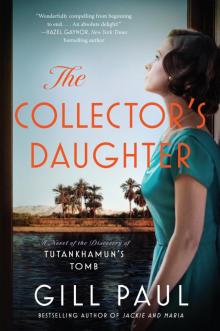 The Collector's Daughter
The Collector's Daughter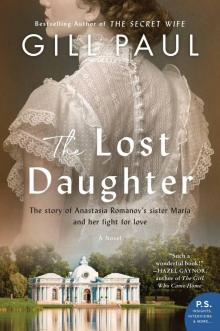 The Lost Daughter
The Lost Daughter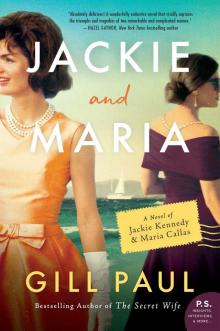 Jackie and Maria
Jackie and Maria The Affair
The Affair Love...Maybe
Love...Maybe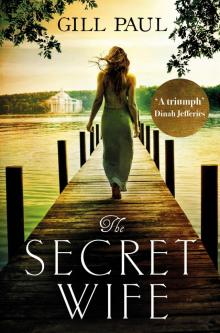 The Secret Wife
The Secret Wife No Place For a Lady
No Place For a Lady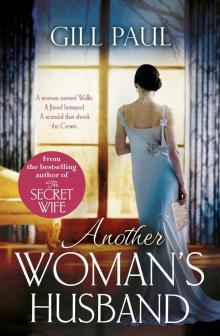 Another Woman’s Husband
Another Woman’s Husband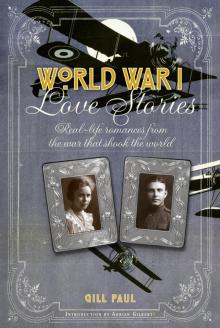 World War I Love Stories
World War I Love Stories World War II Love Stories
World War II Love Stories